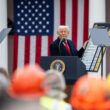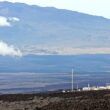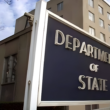Religion’s role
By Bulletin Staff, September 5, 2007
On March 16, 2007, 222 Christians from all walks of life were arrested on the White House
sidewalk for committing civil disobedience in protest of the Iraq War. On the same day, thousands
of other Christians walked in freezing temperatures for the
Christian Peace Witness for Iraq
candlelight march in Washington, and 200 additional vigils around the country included the
participation of thousands more.
While progressives tend to advocate for issues using facts and figures, conservative Americans
have been more successful in creating a cogent frame for favored policies–often drawing on
biblically based language to frame issues. In the United States, a nation in which more than 91
percent of the population identifies themselves as religious, to ignore the inherent immorality of
nuclear weapons is to close an important channel of communication. So many great social
movements–including suffrage for women, the abolition of slavery, the civil rights movement, and
the current struggles to end the conflict in Darfur and to stop U.S.-sponsored torture–are deeply
grounded in religious traditions and grew in capacity largely because of their ability to
articulate a moral narrative.
The disarmament movement in the United States is desperately in need of the powerful, visual
imagery that a moral message can provide. Arguments against nuclear weapons from disarmament
experts are well-reasoned and solid: The nuclear weapons complex is a waste of tax dollars; the
nuclear arsenal encourages the global spread of nuclear weapons; and nuclear weapons facilities
wreak havoc on the environment and public health. But contrary to our best intentions, these
arguments can come out in the form of a laundry list rather than a powerful and coherent
narrative.
When people of faith talk about the need to eliminate nuclear weapons, they call on powerful
imagery and descriptive language. The Central Conference of American Rabbis names the traditions
that led them to call for an end to the nuclear arms race:
Sakanat Nefashot, the danger of exposing oneself to health hazards;
Bal Tashchit, the abhorrence of willful destruction of the environment; and
Yishuv Ha-arets, the betterment and guardianship of the Earth. Muslim leaders speak to the
Koran’s injunction to build an abode for peace in the world. Using vivid language from religious
traditions contextualizes the immorality of nuclear weapons for Americans and allows them to
advocate for disarmament from the depth of their own traditions. Rather than simply working for a
policy change, some people of faith come to view the elimination of nuclear weapons as a divine
mandate and commit themselves fully to the task.
The involvement of religious communities in nuclear weapons is not mere wordsmithing, but a much
deeper process. In the words of Cardinal Joseph Bernardin, the nuclear issue is not simply
political, but also a profoundly moral and religious question, and therefore, the Church must
participate in the process of protecting the world and its people from the specter of nuclear
destruction.
For many religious Americans, the Bush administration’s proposal for the production of new
nuclear warheads is a moral crisis and must be posited as such. Through organizations such as
Faithful Security, religious people
who identify themselves based primarily on their faith have a way to join their collective voices
together to call for a commitment to disarmament.
Share: [addthis tool="addthis_inline_share_toolbox"]













